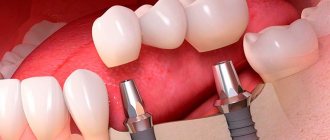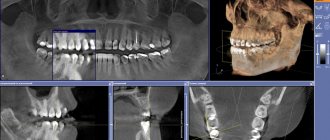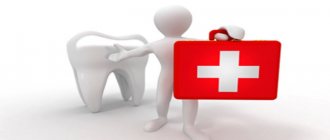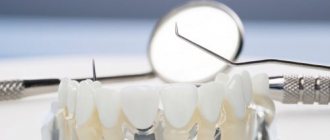Modern dentistry is undoubtedly the latest generation of implantation. Science and technology in this area are ahead of their time; the development of implantology can be compared to space developments. Continuous study of a huge number of clinical cases, analysis of results, implementation of innovative solutions, improvement of materials and types of implants has already made it so that modern dental implantation is completely painless, safe and allows you to restore an entire row of teeth even in one visit.
Modern dental implantation
Dental restoration using implants began in the mid-twentieth century. The metal rod installed in the jawbone has changed over time, and new methods of its installation have appeared. Outdated plate implants are no longer used. Doctors have moved away from the intramucosal, superiosteal method and some others. Nowadays, new generation dental implants are artificial roots made of titanium alloy, which are biocompatible with the human body, do not cause allergic reactions, are durable and reliable for chewing loads. They play the role of real roots, preventing the atrophy of bone tissue that would inevitably occur in the place of lost teeth. And new implantation protocols make it possible to quickly solve the problem of the absence of one or all teeth, without preparing healthy teeth and even avoiding sinus lifting and increasing the volume of bone tissue in case of its deficiency.
Dental restoration forever!
Installation of a two-stage implant ROOTT (Switzerland) - RUB 27,000. 32,000 rub.
Implantation using classical technology: features, pros and cons
It was already mentioned above that classical implantation is the longest option for restoring lost teeth. Pauses during classical implantation will have to be made both for the period required for tissue restoration after extraction of diseased teeth and for the time required for complete osseointegration of the implanted implant. The total time for classical implantation is 7-8 months.
USEFUL TO KNOW: Two-stage implantation places high demands on the condition of the bone tissue. It must have sufficient volume and density for high-quality fixation of the implant. Therefore, if the indicators are insufficient, preliminary osteoplasty is performed, and after tooth extraction, a pause of two to three months is maintained, which is necessary for complete bone regeneration.
Modern methods of dental implantation
The dental clinic can offer the patient atraumatic, fast and effective modern implantation methods.
Express implantation
(simultaneous implantation). The method of implanting a titanium pin directly into the socket of an extracted tooth is used. Advantages of the one-stage flapless method:
- there is no need to cut the tissue, suturing it, which means less time will be spent on healing and removal of sutures;
- the non-traumatic nature of the operation, which is morally easier for a person to bear;
- installation lasts up to 15 minutes.
In what cases is this transgingival method of modern dental implantation suitable:
- in the absence of one or all teeth on the upper or lower jaw;
- There is a time limit for recovery (it must be done urgently).
In addition, there should not be severe inflammation of the gums and insufficient bone tissue (consultation with a doctor is necessary to resolve these issues).
Implantation with immediate loading
(one-stage implantation). Just a couple of decades ago, after implantation, it was necessary to walk without a visible tooth, without a crown or prosthesis, for the entire period of osseointegration (3-6 months). Which, naturally, caused terrible psychological discomfort in any patient. The latest generation of implantations allows you to immediately install an adaptive prosthesis. A person leaving the dentist's office can smile, speak without defects and eat normally. During the entire period of engraftment of the titanium pin, its fusion with tissues and blood vessels, a lightweight temporary prosthesis allows you to get used to the presence of the orthopedic structure in the mouth and not experience discomfort in everyday life.
Contraindications
Dental implantation is a complex surgical operation that has a wide range of contraindications, both absolute and relative.
The procedure is completely contraindicated in the following cases:
- with severe mental disorders;
- for cancer of any origin;
- if a blood clotting disorder is detected;
- for severe autoimmune and rheumatic pathologies;
- for tuberculosis;
- for diabetes mellitus;
- for osteoporosis.
Relative contraindications include conditions that must first be cured, and only then think about surgery:
- caries;
- gingivitis, stomatitis;
- periodontitis;
- hormonal imbalance can cause pin rejection;
- pregnancy period;
- breastfeeding period;
- childhood;
- smoking, alcoholism and drug addiction;
- anorexia;
- insufficient oral hygiene;
- acute respiratory diseases;
- rehabilitation after injuries, operations, radiation therapy.
After eliminating the relative contraindication, implantation can be performed on the recommendation of the dentist.
Indications:
- absence of one, several teeth or complete edentia.
Dental implantation using a surgical template
. The use of 3D modeling helps the doctor accurately plan the operation, eliminating all risks and undesirable consequences. The modern method of implantation using a surgical template is the key to the successful work of an implantologist and orthopedist.
After a CT (computed tomography) scan, the doctor outlines the location of the implants in the program, which he then works with to decide at what angle and what type of implant to install. And the technician is already preparing to make temporary crowns and prostheses, which will be fixed on the day of implantation.
Indications:
- absence of several teeth or complete edentia;
- a complex clinical case that requires a particularly careful approach.
Implantation
All-on-4 and All-on-6
. Modern dental implantation “All on four” or “All on six” allows you to reduce the financial burden of restoring the entire dentition. By implanting only 4 or 6 titanium rods, you can install a complete denture on the jaw with 10-12 artificial crowns. Installing an implant instead of each tooth would require more money and time.
Indications:
- absence of most teeth or complete edentia;
- inability to wear a removable lamellar denture.
This modern implantation method allows people with removable dentures to securely fix it.
Complex implantation
. “All inclusive” in dental treatment. In one visit to the dentist, teeth are removed (if necessary) and an implant is inserted. A method for immediately restoring multiple teeth. Prosthetics on 6-12 implants with a fixed prosthesis.
Indications:
- impossibility of two-stage implantation;
- absence of 3 teeth to complete absence;
- urgency of recovery.
Resmile
. Implantation technology without cuts or sutures. The transgingival method of implanting a titanium root is atraumatic, healing occurs quickly. The combination of implants from one system increases the success rate and minimizes complications. This is facilitated by a titanium-based ceramic composite prosthesis, which is installed on the 4th day and does not require replacement subsequently; it is permanent.
New generation of dental implants
Implant manufacturers are constantly researching and developing new types of dental implants. By studying numerous clinical pictures from the practice of doctors, they create new types of threads, improve the alloy, and change the method of processing the surface of the product.
New generation dental implants:
- Compression implants. The very tight contact of titanium and tissue promotes rapid osseointegration.
- Multi-units with a rotating abutment head, screw fastening for fixing the prosthesis with screw fixation.
- Basal implants are placed where there is critically little bone tissue. Their implantation occurs in deeper, dense layers.
The titanium alloy is being improved, and the grinding and processing of the implant surface takes place in several stages. This is sandblasting and etching. The main thing is to achieve the necessary roughness of the root part of the implant for successful survival and cleanliness, the absence of traces of organic matter during production. The necks are made smooth to prevent the accumulation and reproduction of bacteria on them. Every nuance is taken into account. And the creation of a wide range of implants allows the doctor to comprehensively use different types of artificial roots within one operation.
Modern systems have a warranty of 25-50 years, and many manufacturers provide a lifetime warranty. The survival rate of implants takes from three months to six months, and the success of osseointegration of new generation dental implants reaches 98.5%.
Designs with tapered abutment connection
Another improvement in the field of implantology is the development of a monolithic (non-removable) implant with a conical abutment. The cone ligament rationally distributes the load and provides the best mechanical stability of the artificial root. Thus, it became possible to insert the structure below the level of the cortical bone, which has poor blood circulation.
Advantages of the technology:
- integrity of the structure;
- uniform load distribution;
- impossibility of penetration of pathogenic microorganisms;
- fusion of tissues with implant coating;
- maintaining normal blood circulation of structures;
- excellent aesthetic appearance;
- long service life.
Alternative Methods
You can restore the integrity of the dentition using:
- removable prosthetics. It is inexpensive and can immediately replace all lost teeth. But it takes a long time to get used to such voluminous structures; at first they can cause a gag reflex. For more reliable fixation, additional means such as Corega are often used to prevent the prosthesis from accidentally falling out. Aesthetics are poor, and tissue atrophy progresses inexorably. With prosthetics on implants this is impossible.
- prosthetics with a bridge supported by adjacent teeth. In this case, the supporting teeth grind down and become weaker. With constant chewing load, such structures may collapse over time.
- crowns If the tooth root is preserved, it can be restored with a crown. If the root is destroyed, then the only options left are single implantation or a bridge;
- classical implantation. A two-stage protocol involves installing a root-shaped implant, waiting for it to engraft into the bone, and only then fixing the permanent prosthesis. This is a long process (from 3 to 6 months), during which the titanium rod is completely osseointegrated into the jaw bone.
Free consultation on the cost of treatment in our dentistry
Leave a request and the clinic administrator will contact you within 15 minutes!
Also, the advantages of mini-implantation include:
- Gentle technology for implantation. The implantologist will simply screw the titanium screw into the bone, without cutting tissue;
- Affordable price for the implantation system and services in general. It is possible to restore the entire dentition for an amount starting from 100,000 rubles;
- Mini-implantation does not place high demands on the condition of bone tissue, which means it can be performed without prior osteoplasty and if significant bone atrophy is detected during diagnostics.
Naturally, you cannot remove a prosthesis installed on mini-implants at will and on your own - for this you will have to consult a doctor.
Price
Modern dental implantation is more expensive than prosthetics. The cost of treatment depends on several factors:
- chosen method;
- use of a surgical template;
- number of implants;
- company manufacturer;
- material of prosthesis, crown;
- qualification of an implantologist.
For example, the price of one-stage implantation with a temporary crown is about 40,000 rubles, the All-on-4 technology of one jaw with an adaptive prosthesis will cost from 190,000 rubles, one-stage implantation with complete edentia of one jaw on 6 compression implants and a temporary prosthesis - in the region RUB 265,000 The cost item may increase due to additional diagnostics and prosthetic materials.
Cost of the service: what is included in turnkey implantation, and what will have to be paid separately?
The price of two-stage implantation will depend on the type of implantation system that will be chosen. Traditional implantation is widely used in modern dentistry, so it is not surprising that implantation systems for it are offered in a wide variety of types and by different manufacturers. You can choose a budget option for implants, or you can opt for premium designs with a lifetime guarantee.
USEFUL TO KNOW: The cost of the implantation system and all its components is a significant factor in determining the price of implantation in general. Which implant option do you prefer? This question is best asked to a doctor, but we draw your attention to the fact that the result of implantation largely depends not on the type of titanium screw that will be implanted, but on the level of professionalism of the doctor performing the operation. The slightest mistake can cause the titanium screw to fail and cause various complications.
Therefore, before implantation, it is worth studying information not only on products of different brands: be sure to find out all the details about the clinic where you plan to undergo the procedure, and the level of training of its specialists.
In addition to the price of implantation systems, the cost of the turnkey service also includes an examination, a panoramic image, consultation with an implantologist, drawing up a treatment plan, anesthesia necessary to relieve pain, implantation of a titanium screw, and installation of components.
USEFUL TO KNOW: The price of a permanent crown that will be placed on an implant is not included in the price of turnkey implantation. You will have to pay separately for its production and installation. The amount of expenses will depend on the type of orthodontic structure and the material of its production. The most expensive option at the moment is structures made of zirconium dioxide.
Additional procedures (osteoplasty, caries treatment, oral cavity sanitation) are not included in the price of implantation; they will need to be paid separately.
Where to go for the latest generation of dental implants
Only dental clinics with technologically advanced diagnostic and surgical equipment and highly qualified staff can offer a choice of modern methods of dental implantation and a guarantee for their work.
The table shows several Moscow clinics where you can restore a beautiful smile in an advanced way. We advise you to find out the cost and current promotions directly on their websites.
| dental clinic | Website |
| Center for Dental Implantology ROOTT (RUTT) | https://dentalroott.ru |
| Dentum dentistry | https://dentumclinic.ru |
| City-Dent | https://city-dent.rf |
| The president | https://www.prezi-dent.ru |
| Center Family Dentistry | https://family-dental.ru |











